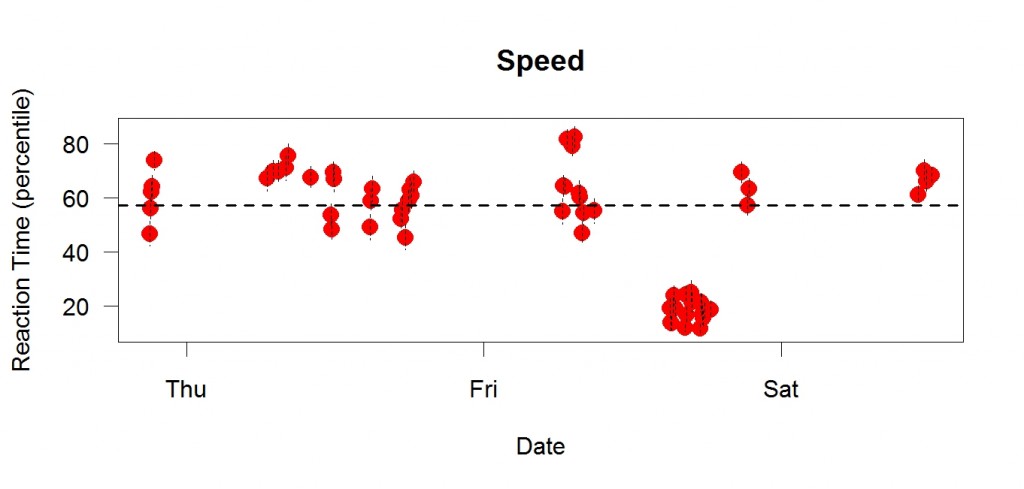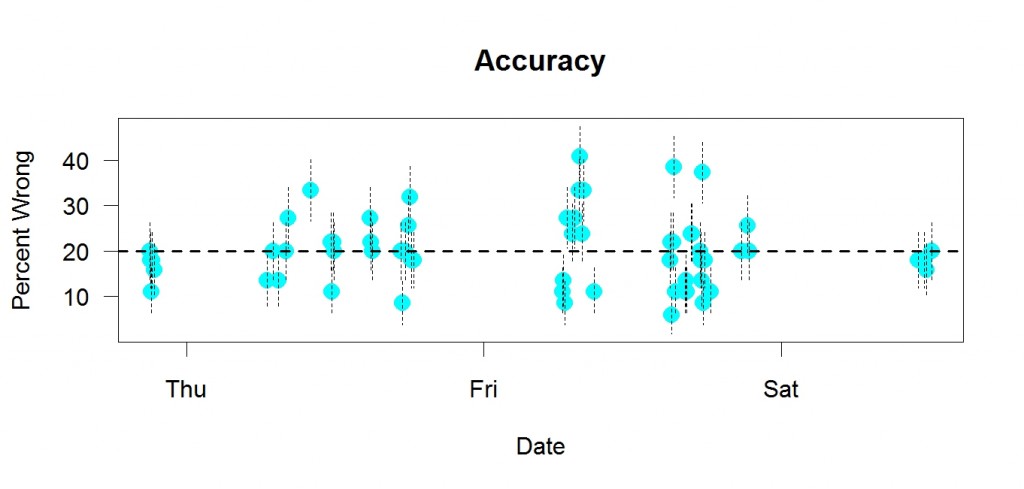 This is me a few days ago. I did a choice reaction time task many times. Each dot is a session with enough trials to supply 32 correct answers.The y axis is in “percentile” units, meaning speed relative to recent performance. If my speed was at the average of recent performance, the percentile would be 50, for example. Higher percentiles = better performance = faster (shorter reaction time). Each point is a mean; the vertical bars are standard errors. The dotted line is the median of the means.
This is me a few days ago. I did a choice reaction time task many times. Each dot is a session with enough trials to supply 32 correct answers.The y axis is in “percentile” units, meaning speed relative to recent performance. If my speed was at the average of recent performance, the percentile would be 50, for example. Higher percentiles = better performance = faster (shorter reaction time). Each point is a mean; the vertical bars are standard errors. The dotted line is the median of the means.
The graph shows that Friday afternoon I was suddenly unusually slow. After dinner, I returned to normal. A change from 60%ile to 20%ile to 60%ile resembles an IQ change from 105 to 87 to 105 (an 18-point change).
At the same time accuracy was roughly constant:

Because accuracy was roughly constant, the change in speed was not due to a shift on a speed-accuracy tradeoff function.
There are two puzzles here. 1. Why were my scores low Friday afternoon? 2. Why did they recover after dinner? On Friday I didn’t feel well. As a result, I didn’t eat much. Maybe my blood sugar was lower than usual. I usually eat 30 g butter twice/day. On Friday I didn’t have any. At dinner I did have moderate amounts of pork fat (but not butter) and sugar (in lemon citron tea). Friday 6 pm I had a cup of black tea. Although I haven’t noticed effects of tea on these scores, there’s a first time for everything.
Here is a clue to what makes my brain work well (= fast), I conclude. Butter causes sudden improvement, I have found; which makes it plausible that lack of butter (and other animal fat) could cause sudden degradation. Another possibility was that my blood sugar was low Friday afternoon. (I didn’t think of this at the time, and didn’t measure it.) I’m surprised that something as important as brain function would be as fragile as these results imply. When various nutrient deficiencies are studied with conventional measures, it generally takes weeks or months without the nutrient for the bad effects to become apparent. It takes many weeks without Vitamin C to get scurvy, for example.
These results raise the intriguing possibility that everyone has sudden ups and downs in brain function and that these ups and downs can be detected at high signal/noise ratios. If so, we can use these ups and downs to learn how to make our brains work well. These results also imply — because my choice reaction time test required only a laptop — that anyone can detect them, study them, and learn what causes them. No experts needed. What a change that would be.
I’m currently running some similar tests.
I noticed that in the morning my responses are pathetic.
But tend to improve around noon and peak around 6pm.
I need to find a way to make the tests FASTER so I do them more often.
But it would be nice to get even responses …
I’ve noticed that my performance of tasks involving manual dexterity is best when my normally chilly hands (~75°F) are closer to body temperature. I have seen this effect in my typing and guitar playing, as well as in my times on tests at the website ‘cognitive fun’ (e.g. the reaction time and flanker tests). The effect seems to be the same no matter whether I warm up my hands by exercising, considerably overconsuming calories, or hanging out somewhere hot, and with respect to my typing speed the difference is roughly equal to one standard deviation.
So, hand temperature might be an interesting variable for you to track, at least for a period, if you haven’t done so already.
Can you try the same experiment with fish oil (or other omega 3)
Did the butter contain omega 3′ ALA, EPA, DHA (the grass fed contain omega 3)?
Seth: “The same experiment”? what do you mean? I don’t know about the omega-3 content of the butter.
Perhaps your immune system was fighting a low level infection. The body prioritized that fight over general quickness.
I’m curious what a “choice reaction time task” is. Is there software for this? Web apps? I searched on the term and saw a few things similar to some lumosity.com games. Just interested in what people are using and what this is proposed to measure.
I second what David said. I have noticed a number of times that my body prioritizes fighting an infection over other tasks, especially those self-initiated initiatives which require willpower.